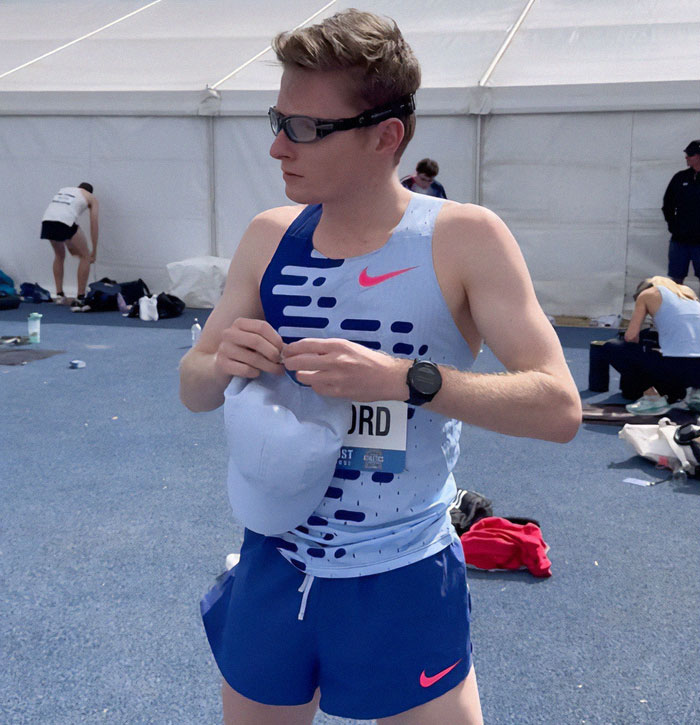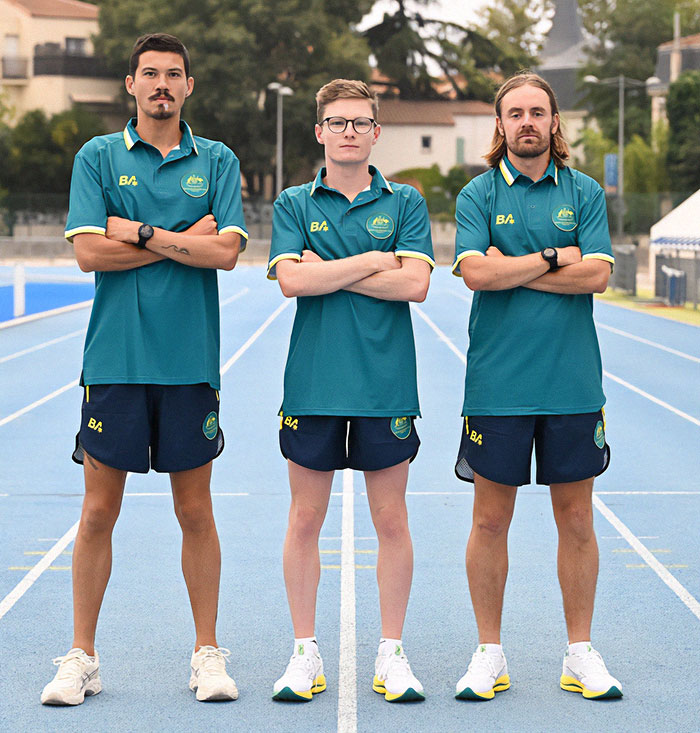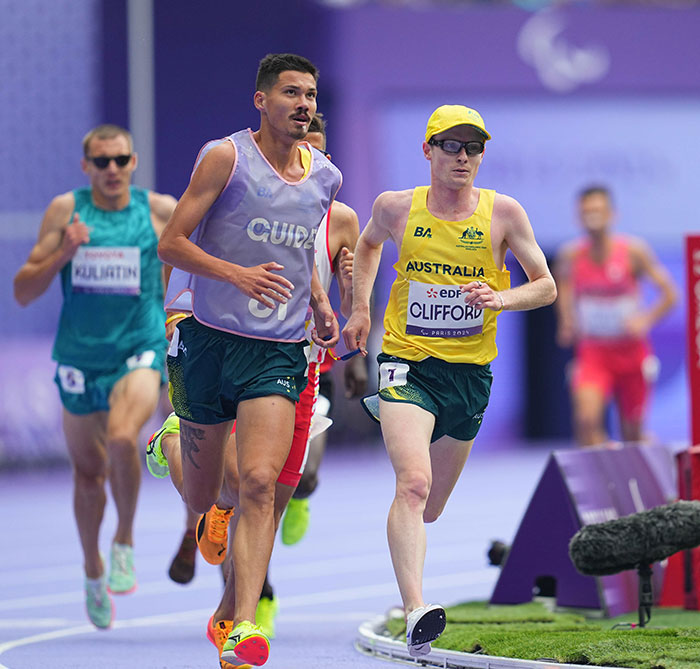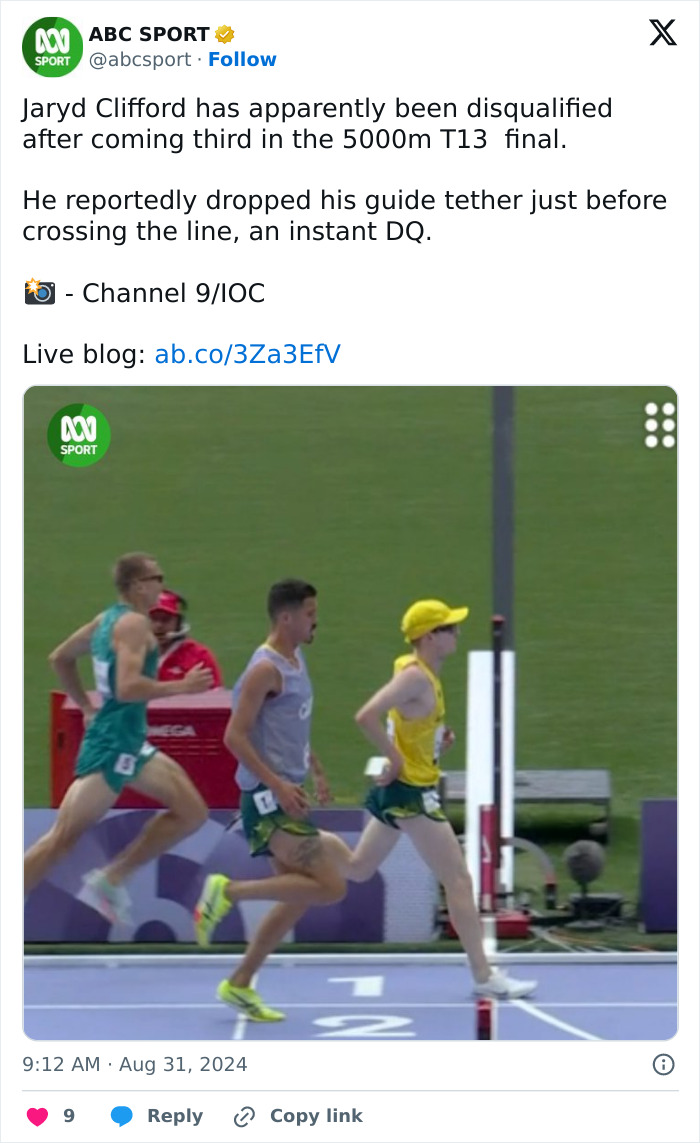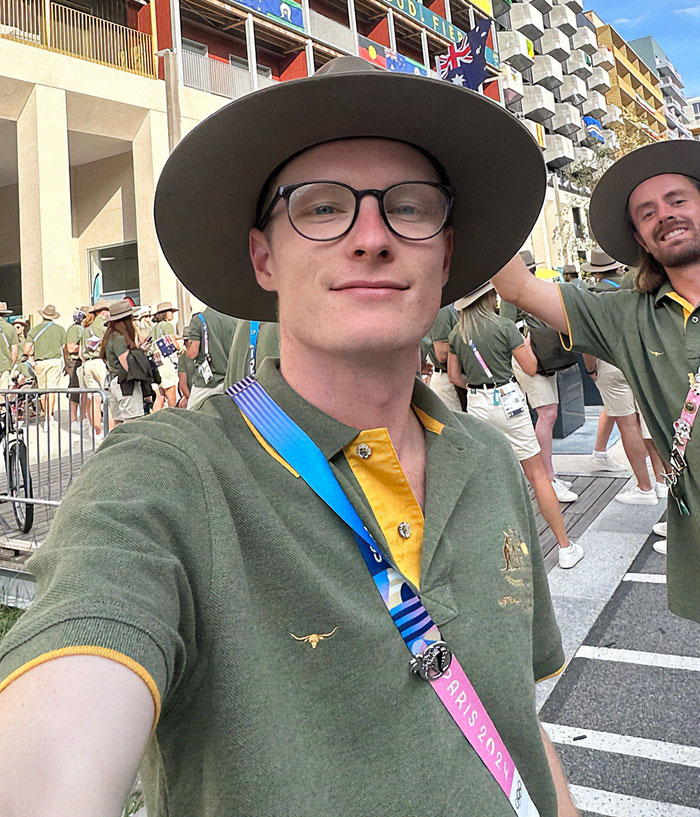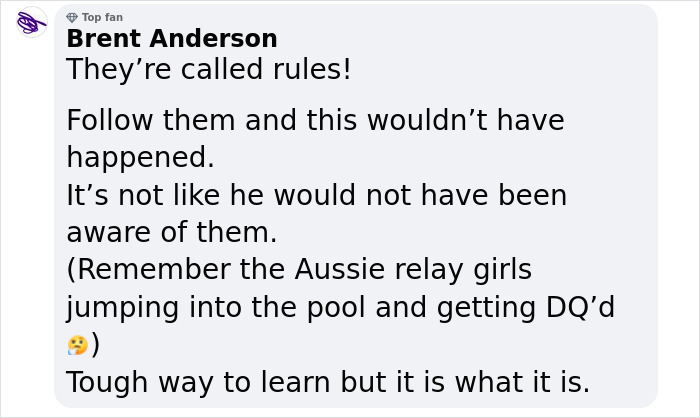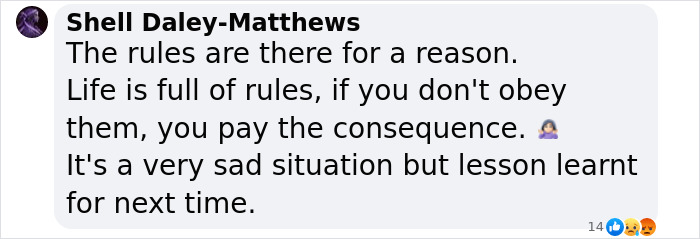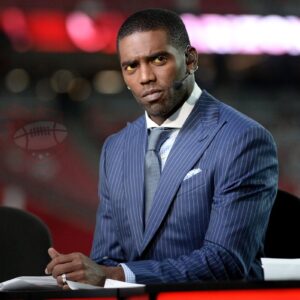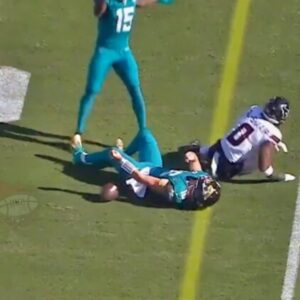An Australian Paralympic runner was disqualified and stripped of his bronze medal after officials said he dropped the tether connecting him to his seeing-eye guide.
Jaryd Clifford finished third in the Men’s T13 5000m final, a category for athletes with visual impairments, last Saturday (August 31).
However, his celebration was cut short after he learned that he had been disqualified due to a rule breach.
Runners and their guides are required to hold the tether, a 20-inch-long band with handles on both ends, until the end of the race, as per the New York Post.
Paralympic runner Jaryd Clifford was left “devastated” after being disqualified and stripped of his bronze medal for breaking a rule in the Men’s 5000m final
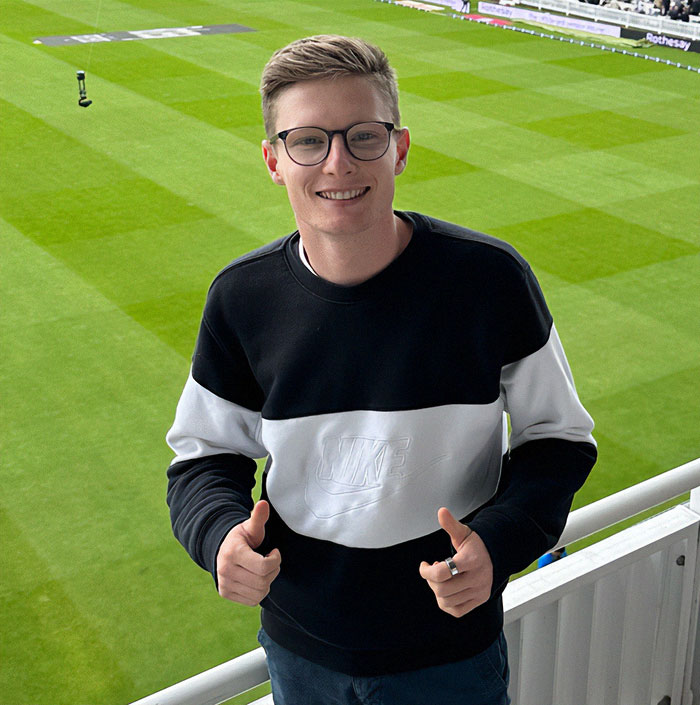
Image credits: jarydclifford
Officials from the International Paralympic Committee (IPC) ruled that Clifford let go of the band that was binding him to the guide, Matt Clarke, for the second part of the race before crossing the finish line.
“I’m not just shattered for me; I’m shattered for them [his guides],” the 25-year-old said after learning the news at the Stade de France.
“They give everything for me out there. That’s sh*t. I can’t see how they DQ’d us, but I’m sure there’s a reason, which makes me nervous.”
Clifford, who is legally blind, let go of the tether connecting him to one of his guides, Matt Clarke, just inches away from the finish line
Image credits: jarydclifford
He added: “I went and saw mum and dad and my girlfriend and broke down.
“I had my little cry on the side of the track. If you talk about reacting to results as grief, I had my grieving moment.
“Out on the track, I was a little bit numb; I’m still a bit numb. I am pretty shattered, to be honest. If I’m frank about it, we went in with the aim of winning gold.”
Image credits: jarydclifford
Athletics Australia said they would protest the ruling, but officials stated there were no grounds to do so.
Yassine Ouhdadi El Ataby from Spain and Aleksandr Kostin from Russia took home the gold and silver medals, respectively.
Runners and their guides are required to hold the 20-inch-long band until the end of the race
Image credits: Ulrik Pedersen/NurPhoto
In an Instagram post, Clifford reflected on the last-minute mistake, sharing he was “devastated” about his disqualification.
“I’m absolutely devastated that we made such a critical mistake out there today. Remaining tethered is a fundamental rule in guiding, and I’m shattered that I lost my mind in those final meters.
Image credits: abcsport
“I felt good. I have so much more to give, and I promise I’ll bring everything I’ve got for the 1500m on Tuesday.
“Sport can be a cruel beast at times, but the tough times are what make the good times so great.”
“I’m absolutely devastated that we made such a critical mistake out there today,” the Australian athlete wrote
Image credits: jarydclifford
People shared their views about the ruling on social media. While some deemed it too strict, considering Clifford was tethered during the majority of the race, others argued that the penalization was justified.
“Rules need a review, imho. Even things like if the athlete is a certain distance away from the line (like not a lot obviously),” someone wrote on X. “Just an interesting (and devastating for the athlete in this case) scenario.”
“I thought rules were meant to prevent any injustice. What he did gave him 0 advantage over the others,” another person commented.
A third user labeled the decision “ridiculous,” saying, “If [Clifford] had let go during the beginning or middle, I would understand, but he let go at the end to probably have the moment himself.”
“It’s definitely not a little-known rule!!” a separate netizen said. “He let go of his tether as a professional athlete who is not a novice should have known better.”
“That’s hard, but rules are rules! Really sorry for him,” somebody else wrote.
Clifford, who crossed the finish line in 16:12.45, was the only runner in the event to use guides.
He ran with two guides: Tim Logan for the first 2000m, and then Clarke took over for the last 3000m, according to Paralympics Australia.
“Jaryd [Clifford] needs guides to run these distances competitively, but it creates more margin for error, and unfortunately, today was a realization of that,” the Australian athletics team management said in a statement to Paralympics Australia.
Clifford will compete again on Tuesday (September 3) in the Men’s 1500m event
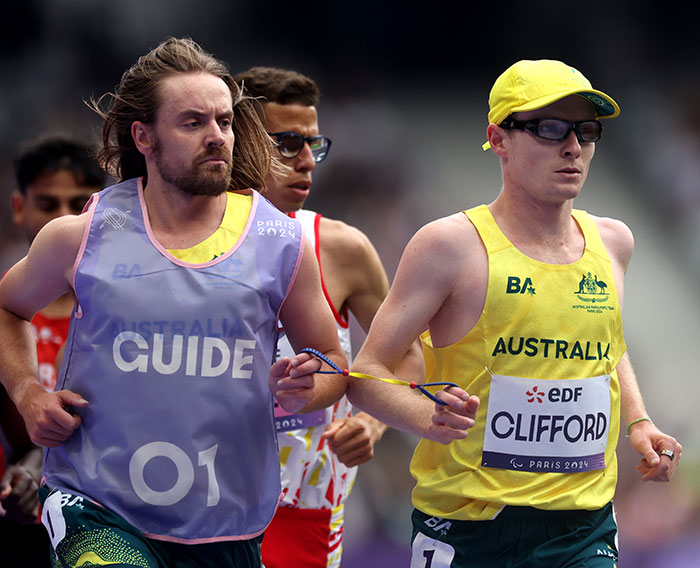
Image credits: Ezra Shaw/Getty Images
According to Nine, the runner has a vision impairment called “Best disease,” an inherited eye disease that causes the macula, the central part of the retina, to degrade.
Best disease can bring problems with central vision or seeing things that are right in front of you, but it may not affect peripheral (side) vision, the Cleveland Clinic notes.
Throughout his career, Clifford has competed both with and without guides.
“When I have a guide it means I can focus on the running. I don’t have to worry about the tactics, [how many] laps to go, which people are around me,” Clifford told the outlet.
“It means when I make a hard move for home, I can go all out and not worry about saving some visual energy for that last lap to make sure I can just get around. Guiding for me is not a need; it’s a want. The pros usually outweigh the cons,” he added.
“Two guides mean they should be fresher. Today, on the last lap, was probably a day where the guiding was a con. But these boys are my best mates.”
The Melbourne native previously competed at the 2020 Tokyo Games, where he took home two silver medals and a bronze.
As a child, he aspired to play in the Australian Football League. However, as his vision worsened, he turned to running as an alternative way to channel his love for sports, according to his Paralympics profile.
“I remember I was just in the schoolyard, kicking the ball around, and [I’d] miss a pass or something simple like that and get frustrated,” Clifford said in 2019.
“I decided running could be a sport where I didn’t have to focus on a ball. It’s cliché, but I feel free when I run.”
While some argued that the ruling was justified, others suggested that the International Paralympic Committee should be more flexible in their decisions

News
Troubling Photo Surfaces Of Randy Moss Following His Depressing Health Announcement
Randy Moss (Photo by Stephen Dunn/Getty Images) Randy Moss has the entire sports world on edge about his health. The Hall of Fame wide receiver and current ESPN analyst did something he never does as he revealed at the start of…
VIDEO: Newest Footage From Highmark Stadium Has Fans Wondering How On Earth The Buffalo Bills Can Host SNF Game vs. 49ers
Highmark Stadium (Photos via @NFL/X) Fans on social media are wondering how the Buffalo Bills will be able to host a football game at Highmark Stadium this Sunday following heavy snowfall at Orchard Park over the weekend. The Bills appear to be…
REPORT: Jacksonville Jaguars Give Sad Injury Update On QB Trevor Lawrence After He Was KO’d On The Field
Trevor Lawrence (Photo via Getty Images)) On Sunday, the Jacksonville Jaguars host the Houston Texans in an AFC South showbowl between the first- and last-place teams. For the first time since November 3, quarterback Trevor Lawrence saw the field. Unfortunately, his time in the…
Concussion Doctor Gives Frightening Update On Trevor Lawrence After Jaguars QB Was Knocked Out Cold vs. Texans
Trevor Lawrence (Photo via CBS) A brawl erupted in Jacksonville after Texans linebacker Aziz Al-Shaair delivered a late, brutal hit on Jaguars quarterback Trevor Lawrence that knocked him unconscious. Al-Shaair made hard contact with Lawrence’s head and neck area as he was…
VIDEO: Cameras Caught Texans’ Azeez Al-Shaair Getting Dragged Off Field By Security After Getting Into Altercation With Fans & Trying To Fight The Entire Jaguars Team
Azeez Al-Shaair (Photos via Fox) Houston Texans linebacker Azeez Al-Shaair will most likely catch a rightful suspension from the league after what he did to Trevor Lawrence. Jaguars QB Trevor Lawrence was carted off the field on Sunday after taking a hit…
Buffalo Bills Announce Postponement Of Special Event At Highmark Stadium Ahead Of SNF Game vs. 49ers
Highmark Stadium in the snow. (Photo via @ChrisWTOL/Twitter) The Buffalo Bills have announced that their ‘Sunday Night Lights’ drone show, initially scheduled for halftime during this Sunday’s game against the San Francisco 49ers, has been postponed. This comes as a result of the…
End of content
No more pages to load
